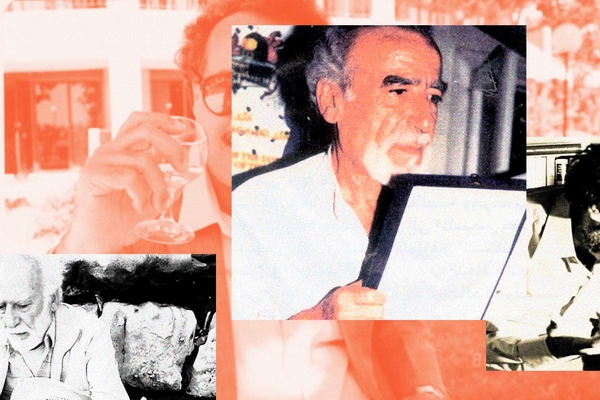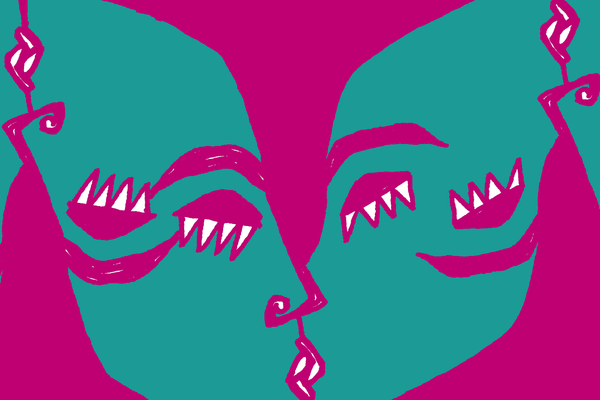يفترق الشعر الشعبي التونسي كما الشعر الفصيح من جهة البداوة والحضارة، إضافةً إلى الفروقات بين الجهات في اللغة والصورة. هذا ويسمّى الغزل بوجهيه العذريّ والحسّي في الشعر الشعبيّ بـ"الأخضر"، نظرًا إلى "ما في القلوب من حسٍّ تُنبّهه العواطف الكامنة فتورق في دنيا الشاعر ربيعًا من الحبّ".
صدرٌ وعجز؛ تسميةٌ لشَطْرَيّ البيت في القصيدة العربية تبوح بتمثّلٍ أنثويٍّ للكون الشعريّ عند العرب منذ الجاهلية تَجَسّد في غرض الغزل، وهو قسمٌ من القصيدة لا يكاد يفارقها،1 وقد تبوّأ امرؤ القيس منبر شعراء الجاهلية فيها؛ إذ يشهد النقّاد القدامى له بأمرين: تصدّره الطبقة الأولى من الشعراء، و"مجاهرته بالفاحشة" في شعره، حتّى أنّ الرسول ذكر أنه "حامل لواء الشعراء إلى النار يوم القيامة"، ويدل اعتبار معلقته أقوى المعلقات السبع أو العشر على تلقي الإباحية بالقَبول في ذلك العصر، بل إنه في معلّقته فاتَ حدّ المجاهرة بأن صرّح فيها بمضاجعته الحبلى من النساء والمرضِع وقد "افترشها" حتى إذا بكى رضيعها وهي تحت الشاعر تقوم له بشقٍّ وشقُّها الثاني لم يفارقه:2
فَقَبْلِك حبلى قد طرقتُ ومرضعٍ***قد ألهيتها عن ذي تمائمَ محولِ
إذا ما بكى من خلفها انصرفتْ له***بشق وتحتي شقها لم يحوّلِ
ولم يمنع انبساط الإسلام على الحضارة العربية مشرقًا ومغربًا من امتداد الغزل في الشعر، بل انفلت متّخذًا نوازع وميولًا أكثر تحّررًا من الأعراف المحافظة، حتّى صار الغزل المثليّ أو المذكّر غزَلاً مستقلاً قائم الذات، وكذلك سجّل التاريخ فتراتٍ اعتلى فيها خلفاءٌ ماجنون السلطة، لعلّ أكثرهم يزيد بن معاوية في حكم بني أميّة، والأمين في حكم بني العبّاس الذي ظهرت في عهده الغلامياتٍ؛ وهنّ جَوارٍ "يصلحن للأَمْرَيْن" أي لما "تصلح له النساء من الأرحام والغلمان من الأدبار!"،3 يقول فيهنّ أبو نواس:
أفديك خذها من يدي عذّبني حبّ غلاميات
يمشين في قُمُص مزرّرات يصلحن للّاطة والزناة
واستمرّ الغزل الحسيّ وشاع في ربوع الأندلس قبل سقوطها، وحافظ على ملامح كثيرة من صورة المرأة في المشرق، وإنما كان التصوير متأثّرًا بخضرة الطبيعة الأندلسية، من ذلك ما قاله ابن زيدون في ولّادة:4
زارني بعد هجعة والثرّيا راحة تقدر الظلام بشبر
ونعمنا بلفّ جسمٍ بجسمٍ للتصافي وقرع ثغرٍ بثغرِ
ومن هذين المصدرين بالأساس، أي الجزيرة العربية، خاصّةً مع الهجرة الهلالية وهجرة بني سليم إلى إفريقيا، ثمّ الأندلس وقد فرّ من فرّ بعد سقوطها إلى بلدان شمال إفريقيا، استمدّ الغزل في الشعر الشعبي التونسي كثيرًا من صوره.
إشكالية تدوين الشعر الشعبي وتحفّظ الدوائر الرسمية منه
يُجمِع الباحثون في الشعر الشعبي التونسي على طابعه الشفويّ حتّى سمّاه بعضهم بالشعر الشفوي؛ كأستاذ الشعر القديم بالجامعة التونسية مبروك المناعي، واعتبر رائد البحث في هذا الشعر الأستاذ والشاعر محمد المرزوقي (من دوز) بأن المدوّنة لم تترك أثرًا "لشعرٍ منظومٍ باللغة الدارجة قبل منتصف القرن الخامس للهجرة، أي قبل الزحفة الهلالية عام 443 هجري"،5 وهذا المصير مشابهٌ لمصير الشعر الجاهليّ الذي ظلّ قرابة المئتي سنة بلا تدوين، فضاع أكثره.
وأرجع المرزوقي بدايات البحث والتدوين في الشعر الشعبي والفلكلور التونسي عامّة إلى مستشرقين ألمان وفرنسيين في أواخر القرن 19، أمّا من التونسيين فأوّلهم حسبه الأديب التونسي الصادق الرزقي في كتابه "الأغاني التونسية" الذي صدر سنة 1967 وساهم في تحقيقه المرزوقي نفسه، ولو أن هذا الكتاب جمع بين الفصيح والعامي، لكن الريادة الفعلية للبحث في هذا الموضوع كانت للمرزوقي في كتابه "الشعر الشعبي" وهو جامع بين الشعر والنثر، والذي صدر سنة 1967 أيضًا، وقد كلفته وزارة الثقافة بقسم الأدب الشعبي، قبل أن تنتقل إدارته إلى تلميذه محيي الدين خريّف صاحب كتاب "الشعر الشعبي التونسي" الذي سار فيه على خطى أستاذه.
ونشير هنا إلى أنّ المرزوقي اصطدم بعوائقٍ في نشر كتابه، ذكرها ابنه رياض المشرف على أعماله الكاملة، ويبدو أن بعض أصحاب دور النشر من "البَلْدِيّة" (السكان الأصليين للعاصمة) تحفّظوا على هذا اللون من الشعر قبل أن تقبل بنشره "الدار التونسية"، ثمّ إنه لم يخصّ الغزل إلا بصفحاتٍ قليلةٍ لا تتجاوز الخمس، وقد أسقط من شواهده الأبياتِ الإيحائيةَ التي سيجرؤ على ذكرها تلميذه خريّف في كتابه، ولا ننسى أن ابن خلدون ذكر نفوره من الأغاني التونسية لرداءتها، وقد اعتبر الرزقي6 ثمّ المرزوقي7 أن ابن خلدون لو اطلّع بعمق على الصور البديعة للشعر البدوي خاصّةً لتراجع عمّا قاله. وثمّة من يعتبر أن الرئيس الحبيب بورقيبة فرض رقابةً على هذا الفنّ، لكن الفنان الشعبي صالح الفرزيط نفى ذلك رغم أن بورقيبة سجنه، ثمّ إنّ الشاعر الشعبي محمد الصغيّر ساسي عُرف بعلاقته الوثيقة بالرئيس، وهو صاحب الطالع الشهير في فترة الاستعمار: "كانك (إذا كنت) مسلم غيورْ *** ادخل لحزب الدستورْ"، ونشير كذلك إلى أحمد باي (1855) كان مولعًا بسماع الشعر الشعبيّ حيث كان يقيم مجالس شعرية واصطفى له أحمد بن موسى شاعرًا له.
الشعر البدوي والحضري وعلاقة الشعر بالغناء
يفترق الشعر الشعبي التونسي كما الشعر الفصيح من جهة البداوة والحضارة، إضافةً إلى الفروقات بين الجهات في اللغة والصورة، فبعض ألفاظ أهل الجنوب لا تُفهم في الساحل والشمال، أما من جهة الصورة فيعتبر المرزوقي أن شعر المدن يخلو "من الصور الشعرية الجميلة – في الغالب – لأنه منظومٌ على نغمةٍ موسيقيةٍ محدودة، أما الشعر البدوي فهو غنيّ بالصور الشعرية الرائقة".8
ويعتبر الباحث التونسي محمد الطاهر اللطيفي أن الشاعر الشعبي ينظم الشعر ليغنّيه بنفسه في الغالب، من أجل هذا كان الارتباط وثيقًا بين الشاعر الشعبي والغناء، "فهو شاعرٌ مطرب أو هو مطربٌ شاعر"9 لذا انتشر في مناطق الساحل بوجه خاص فنّ "الإدبة"؛ جَمْعٌ لأديب؛ وهو شاعرٌ مغنٍّ يحضر المحافل وينشد الشعر موقّعًا، لكن يبدو أن هذا الجمع كان متأخّرًا نسبيًا؛ إذ أفادنا الشاعر الشعبي التونسي ضَوْ حدّاد أنّ كبار الشعراء قديمًا يأنفون من الغناء ويتركونه للنساء، وقد ذكر الأستاذ أحمد الخصخوصي أنّ المألوف "أنْ تغنّي المرأة وألّا يغنّي الرجل".10
الغزل في الشعر الشعبي التونسي
يسمّى الغزل بوجهيه العذريّ والحسّي في الشعر الشعبيّ بـ"الأخضر": "وكأنهم يرمزون بالخضرة إلى ما في القلوب من حسٍّ تُنبّهه العواطف الكامنة فتورق في دنيا الشاعر ربيعًا من الحبّ تغمره الخضرة والظلال"،11 واعتبره محيي الدين خريّف أهمَّ أغراض الشعر الشعبيّ وأقربه إلى الصدق، وسننظر في هذا الغزل من جانبين: لغة الجسد، ثمّ مخيال الجنس.
لم يخلُ عضوٌ من أعضاء المرأة من الوصف تقريبًا؛ حتى الأنف وصفوه: "والخشم (الأنف) تيقانْ (شامخ) سلّال (دقيق)" وأكد المرزوقي وحدة الوصف عندهم و"الإغراق في تشبيه أجزاء بدن المعشوق جزءًا جزءًا"12 ثمّ إن الصور في الغزل الأخضر كغيرها في أغراض الشعر الشعبي هي صورٌ معهودةٌ في الشعر الجاهليّ، خصوصًا الشعر البدوي في الجهات التي يقطنها أحفاد هلال وسليم، وهذا يرجعه المرزوقي إلى توافق المناخ واستمرار العادات والتقاليد.13
ونحن سنهتمّ بأربعة ملامح من جسد المرأة في هذا الشعر: الصدر، والشفة والرقبة، والعجيزة؛ لأنّ هذه الأربع تشكلّ الكون الجنسيّ للشاعر؛ فالشاعر يتدرّج بالوصف مِن الشعر والحاجب والعينين ليتخلّص إلى الشفتين، فتهتاج الرغبة وينجرّ الشاعر إلى وصف مكامن الاشتهاء في جسد معشوقته.
- الصدر:
بلغ ولع الشعراء بوصفه حدَّ أن أفردوا له غرضًا أسموه "اِلنْهودْ"، وتختلف الصفة المطلوبة فيه من الصغر إلى العرض والكبر، ويستعيرون له أنواعًا من الغلال أو الطيور أو كناياتٍ خاصة؛ أما الغلال فالرمّان خاصّةً (للشبه القويّ بينه وبين النهد)، من ذلك بيت الشاعر أحمد ملّاك (من مدينة صفاقس، لُقّب بشاعر الحكمة والملحمة) وفيه ينسب الرمّان إلى أكثر المواضع شهرةً بإنتاج أجود أنواعه؛ وهي قابس:
"رمّانة قابسيّة***ومغطّيهم بوسطو (حمّالة صدر) تحت السوريّة (القميص)"
ومن الغلال أيضًا التفّاح (لاسيّما الأحمر) كما في أغنية الفنان الشعبي محمد البحري (من جهة صفاقس): "عطرك فوّاح وتفاحك ياسر لوّاح". وثالث أنواع الغلال التّين (الكرموس باللهجة التونسية) في قصيدة للشاعرة حدّى الزرقي ذات الأصول الجزائريّة وصفٌ للنهدين بالصغر مع ذلك:
"على صدرها يظهروا صغارْ***كرموسْ في أصل عُودَه"
أما من الطيور، فيكاد التشبيه عندهم يقتصر على الحمام، من ذلك بيتٌ في أغنية لفوزي حسونة (فنان شعبي من جهة صفاقس): "زوز على صدرك غنو ليا".
وقد يلجأ الشاعر إلى الكنايات، فيلمّح إلى النهدين بصورٍ خاصّة، منها كؤوس العسل، كما في قصيدة "ضحضاح" (أي السراب) لمحمد المرزوقي: "على صدرها ريت فنجال (فنجان) *** عسل عند نحّال (بائع العسل).
وقريبًا من معنى الاستتار هذا يذكر أحمد البرغوثي (من أشهر شعراء الجنوب التونسي) توقَ النهد إلى الانعتاق، واحتجابه الذي ألهب رغبته: "فوق الصدر ريت تيّاقْ***محاجيبْ تحت الدراقةْ (الملابس)".
وقد يرفع الشاعر كلفة التلميح، فيجاهر بتسمية ما يصفه من المرأة باسمه في اللغة الدارجة؛ فيسمّي النهد بـ"البزّول"، ومنه "مسدّس نهود" لأحمد ملّاك، يشبه فيه النهدين والحلمتين بمملوك يلبس "شاشية" حمراء، فيتأصل التشبيه بذلك في بيئةٍ تونسيةٍ خالصة، يقول: "بْزازيل حكّرتهم بالنظر***فوق الصدر***ممْاليك لبسوا شواشي حمرْ".
وشبّه الملّاك نهديْ حبيبته فاطمة بالعسس الذين لا يخرجون من أوكارهم؛ يقول:
"اجنابْ (الخصران) فاطمةْ نْجومْ راجع فلكهم *** عليهم ملكهم***وعسس لا يخرجوا من وكرهم"
ويستعير محمد الرويسي (من توزر) للنهدين صورة التوأمين، واصفًا شهوته بالمرض الذي دواؤه صدرُ حبيبته العريض:
الصدرْ عريضْ***عليه توامهْ يبروا المريض
ونجد هذه الصفة للصدر في أبيات لمحمد الصغير ساسي (من الساحل التونسي)؛ يلتذّ فيها بالتفرّج في اتساعه ونهوضه:
"زيد الصدر عتيلْ (واسع)***الفرجة في الأعكان وبزازلها"
- الشفة والرقبة:
أمّا الشفة فتجتمع الأوصاف بين الشعراء على ثلاث: الحلاوة والاكتناز والرقّة، ولم يخرج وصف الشفة كذلك عن الصور الطبيعية؛ فهذا المرزوقيّ يشبّهها بـ"اللمسيّ"؛ نوعٌ من التمور: "شفّة كما لمسي أبّال***في جْنانْ عمّال". أما محمد الصغير ساسي فيشبّه الشفة بالدم المُراق؛ في تخيّلٍ استعاريٍّ لمشهد التقبيل الذي يذيب الشفاه: "الشفة دم يسيل".
ويتلازم ذكر الشفة مع رضاب الفم، وهو الريق، ووصف ماء الفم من الموروث، ونجده في بيتٍ لمنصور العلّاقي (ليبي الأصل تونسي المنشأ): "الشفة من اللُكْ تذبال***والريق يا خالْ". وفي أغنية "نوارة" لفوزي حسونة يشبه الريق بالعسل "يا ريقها عسل في دبّوزة".
ونجد صورةً للشفة "السمراء"، وهي"اللمى"؛ سمرةٌ محبّذة في الشفتين عند القدامى، مع الرائحة العطرة الفائحة من الفم؛ إذ هم كالقدامى ينفرون من رائحة الفم الكريهة "البخر"، تقول حدّى الرزقي: "شفايفْ كما العنبر سمارْ***تقول مسكْ عطّارْ".
وأمّا الرقبة فإنهم يطلبون فيها ما طلب القدامى؛ من الامتداد والبياض، وحتّى التشابيه بينهم نفسها تقريبًا؛ فهذا منصور العلاقي يشبّه الرقبة بـ"رقبةْ غزال" وكذا شبّبها قبله أحمد البرغوثي في ضحضاحه، وهي في أغنية لفوزي حسونة "رقبة بلّارةْ ***ما فيها أمارةْ" أمّا المرزوقي فيشبّهها - وقد تزينت بالحِلي - بشجرة "الرال": "الرقبة كيما شجرة الرال***من الحلي مْليتْ مكالَهْ".
- العجيزة:
يبدو وصف العجيزة والأرداف ضبابيًّا في المُدوّن من الشعر الشعبيّ وفي المُغنّى منه، وفي الغالب لا تُذكر حتّى تلميحًا، ولعلّ هذه الضبابية راجعةٌ إلى شيءٍ من التحرّج، لاسيّما في شعر البدو؛ لكون الأرداف دالّةً على فعل الاتصال الكامل بين الرجل والمرأة، وتحاشيًا من أن ينسب الشاعر إلى التهتّك والفحش ومجاوزة الحدّ، ولعلّ الصدر أيضًا يعتبر العنصر الطرازيّ للميل الجنسي في الثقافة المحليّة، رغم أن الدراسات متضاربةٌ في هذا الموضوع.14 لكن نجد بدائل تكاد تعوّض هذا السكوت عن تسمية العجيزة، من ذلك ذكر "القَد"؛ وهو القوام الكامل للمرأة، وأسهب الشعراء في وصف متعلقاته؛ لاسيّما الأفخاذ الممتلئة، ومن أكثر التشابيه المعبّرة عن الامتلاء والامتشاق هو "البابور" (السفينة) الذي يشق البحر، يقول المرزوقي: "عجيبْ قدها ما لها مثالْ***بابور دهكالْ". وهي صورة تتردد كثيرًا في الأغاني التونسية؛ كأغنية "صالحة" للسيدة نعمة: "قدّك بابور***صالحةْ***عوّام بحورْ".
ويشبّه عمر بن عياد (من القصرين) القَد بالصومعة، ويمثل لها بصومعة زاوية الولي سيدي محرز: "قدّك صمعة سيدي لزهرْ***وتْجيكْ الزيّارَة". ويشبّه أحمد البرغوثي الأفخاذ بمخدّات من الريش عابرًا على الساق التي ارتسم عليها وشمٌ يُلهب شهوته:
"وأْفْخاذها أفخاذ الألياقْ***بالريش توساق
ووشام في عضلة الساق***وأقدام لاهُم نتاقهْ"
ولعل الطَقس الذي يكون مناسبةً لإظهار مكامن الإثارة في الأرداف هو "الشطيح" (الرقص)؛ كما في أغنية لمحمد البحري:
"متخبلة ضوّات الليل***متخبلة تشطح وتميل
نسرق في الغزرة لمرادي***بوها واقف لاهي بينا"
ونجد صلة الرقص بالوصال والأحضان في أغنية ذكرها الرزقي:15
"يا للا يا زماني***اشطحْ ما بين أحضاني
باكمامك نوّم الزاني***واعمل لي فارطهْ"
واجتمع الشعراء على تحبيذ الخصر النحيف "الخاوي" لأنّه يُبرز استدارة الأرداف، ويظهر انتصاب النهدين، ولعل بيتيْ أحمد البرغوثي التاليين كافيان لإظهار الرابط بين الخصر والأرداف التي استعاض عنها بالأفخاذ:
"الجوف خاوي طاوي ***الأفخاذ مرمرْ بنيّها متْساوي*** عرصات جامع والسطا (رئيس العمال) لولبهم"
وأقرب ما وقعنا عليه من ذكر الأرداف بيتٌ للبرغوثي؛ يُذكر فيه اللباس "العرضاوي" نسبةً إلى موضعٍ بجهة قابس، وهو لباسٌ يشفّ عمّا تحته من الأعضاء إذا تعرّض للريح؛ يقول: "عرُضْها النسوم ولِبْسها عرضاوي***خلّى عضَلها مهتّكات حْجُبْهم".
وصورة النسيم الذي يكشف ما احتجب من مرغوب الرجل في المرأة متردّدةً في المخيال الشعري التونسي؛ من ذلك ما جاء أغنية "لزرق واتاك" التي أدّاها الفنان الكبير إسماعيل الحطّاب (من صفاقس) حيث يصف الشاعر حبيبته صالحة التي مرت أمامه "بفستانها الأزرق الذي طار بفعل الريح فظهر تبّانها الأبيض":16
"صالحة لزرق واتاك***تحتو الأبيض شي عجب
هزّو الريح وبان أعضاك***والعاشق عقلو تسلب"
مخيال الجنس
يرسم الشاعر في تضاعيف قصيدته الكون الحميميّ الذي يجمعه بمعشوقته بعد أن وصف منها ما يشتهيه، وتبلغ الشهوة حدًّا يشترك الشعراء في التعبير عنه بـ "الجرح" و"المرض" و"الداء" والنار "الميقودة" وعمى العينين والسكر و"الدوخة" ولا دواء إلّا في الوصال، ويتّخذ هذا الكون تصاوير وتعابير مختلفة؛ فمحمّد البحري يكنّي عن رغبته في المرأة الراقصة التي رآها برغبته في المبيت معها؛ "شاهي الليلة معاكْ نباتْ".
ونجد التعبير عن الوصال بالماء متردّدًا كثيرًا، جاء في أغنية لفوزي حسونة وصفٌ لمحنة العاشق التي دواؤها "ماء" الحبيبة: "خويّك ممحون***شاهي من ايديك الميّة"، وفي الأغنية الجربية "يا ذابل الأعيان" صورةٌ للصادي العطشان الذي يستسقي الماء:
"يا ذابل الأعيان بربي***تعطيني شريبة عطشان"
وفي أغنية "جبال الكاف" نجد المرأة تتهيّأ لعناقٍ حارّ لحبيبها الذي كان غائبًا عنها، وتبوح الأغنية بتشّهٍ لقبلة من الشفتين تطفئ بعضًا من اضطرام الشوق:
"هاو خالك (حبيبك) جاء
يا وعرّضيلو (اعترضيه) بالحملة (بالعناق)
واعطيه ابيسة (قبلة) من الشفة"
ونجد العاشقة في أغنية "قالولي جاي" لنبيهة كراولي تعدّ نفسها لمّا سمعت بمقدم حبيبها، فتهيّئ جسدها بالزينة والتعطّر، وتعدّ "السدّة" فراش الزوجيّة بالغطاء الناعم والمخدّات، وإن كانت ترى ذلك قليلًا في حقّ حبيبها الذي حُرم منها مدّةً:
"صدّقتْ الغير***قلتْ نعلّي في السدّةْ
وفراش حرير***عليه ملاحف مخدّةْ
شاشين (أساور) في يديا***حرام وسورية
ونقول شوية***على ولفي غايب من مدّةْ"
والكناية بالحرام والسورية من الكنايات المنتشرة في التراث الكافي باعتباره من متعلّقات الطقس الحميميّ، ونجدها في أغنية "زعرة مصقولة الناب" حيث يدعو العاشق محبوبته إلى جبلٍ في الكاف يقضيان فيه الليلة:17
"وهيا نمشو للكاف ونهزو حرام وسورية***ونزيدو سبعة شمعات****باش نعدو السهرية"
وقد تتواتر مقاطع كاملة في بعض الأغاني تصوّر تفاصيل الوصال؛ حيث تَشِي العاشقة برغبتها الشهوانية في حبيبها داعيةً إياه إلى التمتّع بها معبّرةً عن ذلك بــ "الزهاء (الزهو)" كما في أغنية "لسمر خويا":
"البارح جاني يلقاني راقدة عالمخدة يا مخر الليل تعدّى
يا لسمر خويا نحبّ نزهى معاك، يا لالي يا لالي..
وارقد وأرقد وتوسد زندي يا لسمر وتمتع يا لسمر"
ويبدي العاشق استعداده لبذل ما لا يحصى من المال في سبيل ليلةٍ واحدةٍ يقضي فيها وطرًا في الرقبة والصدر؛ كما في إحدى أغاني مجموعة برقو08:
"لو كان عندي مال هارون هاي نهديه ونبات عندك
.. للّا راني نتكبّ يا طويلة بين بزازلك والرقبة"
وفي أغنية "أمان أمان" وصفٌ جريءٌ لوضعيةٍ حميمة بين العاشقين، وهما يتقلّبان على الفراش العالي:
"أمان أما يا ددّو***على الفرش العالي نتمدو
ونحط الخدّ على خدّو***ونعملو نومة شقلابي"
الغزل الإباحيّ
نجد ضربًا آخرَ من الغزل الحسيّ خرج عن حدّ التلميح إلى ضربٍ من الإباحيّة الماجنة لا يتحرّج فيها أصحابها من وصف فعل الإيلاج ورحم المرأة وقضيب الرجل بألفاظ اللسان الدارج الصريح، وأصحابها مجهولون، وقد عدّها الرزقي الذي يعتبر محافظًا من "أغاني السوقة لا تتورّع عن البذاءة أحيانًا، منحطّةً في أخيلتها وتعابيرها لأنها في الأغلب من نظم اليهود المحترفين"،18 وصنّفها ضمن أغاني "الزندالي"، وأصل الكلمة مشتقٌّ من Zindan والتي تعني في اللّغة التّركيّة "السّجن"،19 وأصحابه يتناشدونه "في مجالسهم الخاصة خِلسة" وأحيانًا يتناشدها الرجال في المحافل بعد أن تغادر النساء، ومنه هذا المقطع الذي يصف باهتياجٍ عارمٍ فعل الإيلاج كما في اللسان الدارج:
"زبي لحمر خشّ (ولج) النونهْ (البظر)***لقاها سخونهْ***وخّر واعطاها بقرونهْ"
وحتّى وصف عين المعشوقة لم يخلُ في هذا الغزل من مجونٍ صريح، ولعل ذلك راجعٌ إلى تصوّرٍ لديهم بأن العينين تفضحان اهتياج الرغبة في المرأة:
"عينيك نيك في نيك***وحواجبك قحب صافي
نحب نحطّو بين رجليك***علاش من النيك تخافي
في الظلمة تشعل تراميك (أردافك)***يا ما احلى النيك والضو طافي"
ونجد هذا التهتّك في شعرٍ نسائيّ، تصف فيه المرأة تفاصيل حميمة عن مواقعة عشيقها لها؛ حيث ارتشف شفتيها وحلمتيها:20
جاني للجنينةْ***يا الأغنجْ يا مذبّلْ عينه
ديني على دينَه***عضّ الشفّة مع البزّول
بدأ الاعتبار يرجع شيئًا فشيئًا اليوم إلى الشعر الشعبي التونسي، ونطالع أحيانًا بعض الدعم الثقافي الرسمي لإحياء التراث الغنائي ببعض الجهات، كعمل المخرج لسعد بن عبد الله الذي جمع التراث الغنائي بجهة الكاف سنة 2000 في عرضٍ فرجوي بعنوان "المنسيات" بإشراف مركز الفنون الدرامية والركحية بالكاف، وإصدار وزارة الثقافة موسوعةً من عشرة أجزاءٍ بعنوان "مدوّنة الشعر الشعبي التونسي"، ولا نعدم بحوثًا في هذا الباب مسجّلةً في كليات الآداب على قلّتها، وهذه جميعها أَذِنَت لمرحلة اعتراف بأن الرصيد الشعري الشعبي هو مكوّنٌ أساسيّ للهويّة الثقافية التونسيّة التي اعتصرت في كينونتها جدل أكثر من 3000 سنة من تعاقب الحقب والحضارات.
- 1الدينوري ابن قتيبة، الشعر والشعراء، ج1، الدار العربية للكتاب، بيروت، ط3، 1983.
- 2المعلّقات السبع، شرح الزوزني، دار صادر، مكتبة المعارف، بيروت، ط1، 2004.
- 3يوسف بكّار، اتجاهات الغزل في القرن الثاني للهجرة، دار المناهل، 2009، ص117.
- 4 رحمى عمران، صورة المرأة في الشعر الأندلسي في عصر الطوائف والمرابطين، مجلة القسم العربي، عدد18، 2011، رابط المقال: http://pu.edu.pk/images/journal/arabic/PDF/8_18_2011.pdf
- 5محمّد المرزوقي، الأعمال الكاملة، القسم الثاني: الشعر الشعبي، دار محمّد علي الحامي، تقديم رياض المرزوقي، الطبعة الأولى، 2016، ص76.
- 6الصادق الرزقي، الأغاني التونسية، دار سحر للمعرفة، المغاربية للطباعة، د.ت، ص240.
- 7المرزوقي، نفسه، ص94.
- 8المرزوقي، نفسه، ص81.
- 9محمد الطاهر اللطيفي، الشعر الشعبي التونسي، المغاربية للطباعة والنشر، 2004، ص3.
- 10أحمد الخصخوصي، من مغاني الشعر الشعبي ومعانيه، تقديم محيي الدين خريّف، وزارة الثقافة، 2013، ص20.
- 11محيي الدين خريّف، الشعر الشعبي التونسي أوزانه وأنواعه، الدار العربية للكتاب، 1991، ص53.
- 12المرزوقي، نفسه، ص141.
- 13المرزوقي، نفسه، ص81.
- 14New Theory on Why Men Love Breasts, By Natalie Wolchover, Stephanie Pappas - Live Science Contributor, March 17, 2016
- 15الرزقي، نفسه، ص269.
- 16ريم بن رجب، الشعر الأخضر من العذري إلى الإباحي في الغناء التونسي: https://ma3azef.com/الشعر_الأخضر/
- 17يسرى الشيخاوي، الغناء في الشمال الغربي يتمرد على السلطة الذكورية بالأنوثة: https://weartipsi.wixsite.com/atelierculturel/single-post/2018/10/15/التراث-الغنائي-في-الشمال-الغربي-يتمرد-على-السلطة-الذكورية?_amp_
- 18الرزقي، هامش1، ص245.
- 19سامي اللجمي، الزندالي: من تجلّيات ثقافة المضادّة بتونس: https://www.alawan.org/2013/12/08/الزندالي-من-تجلّيات-ثقافة-المضادّة-بت/
- 20الرزقي، نفسه، ص217.



Add new comment